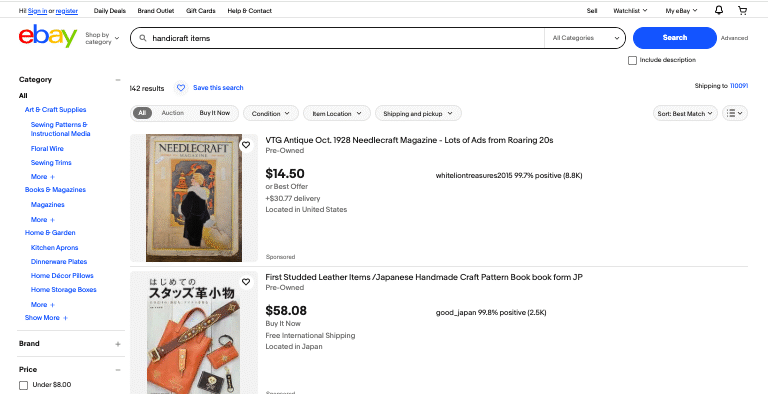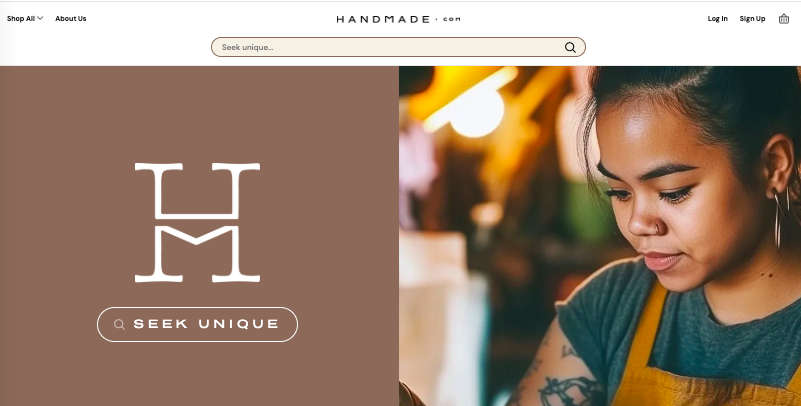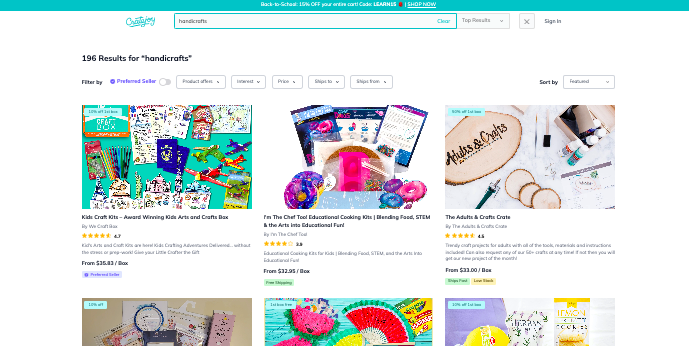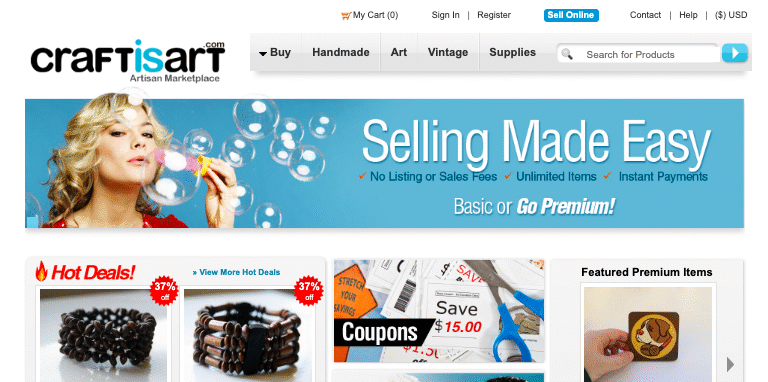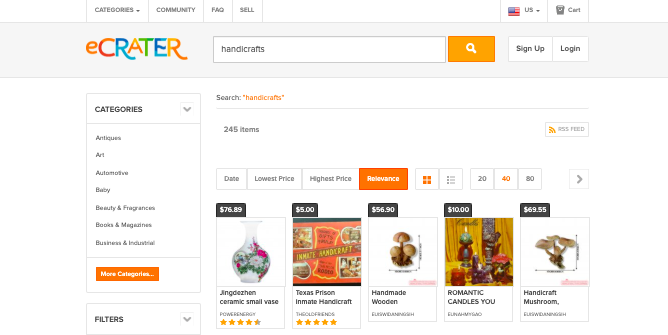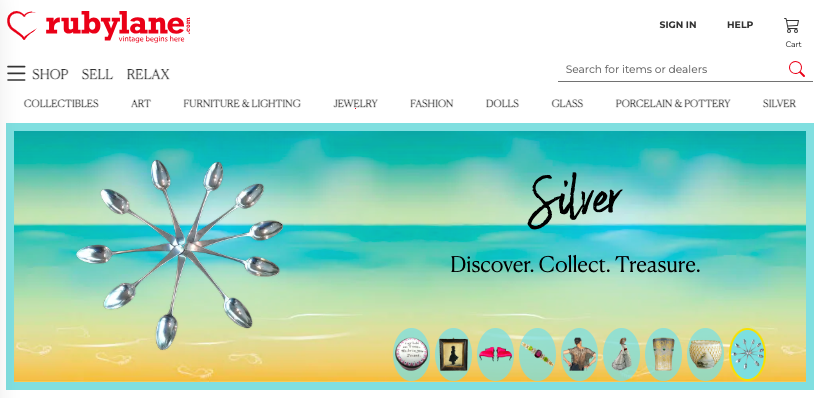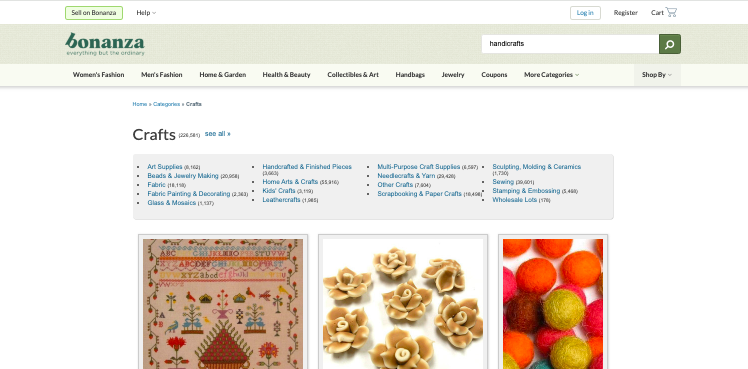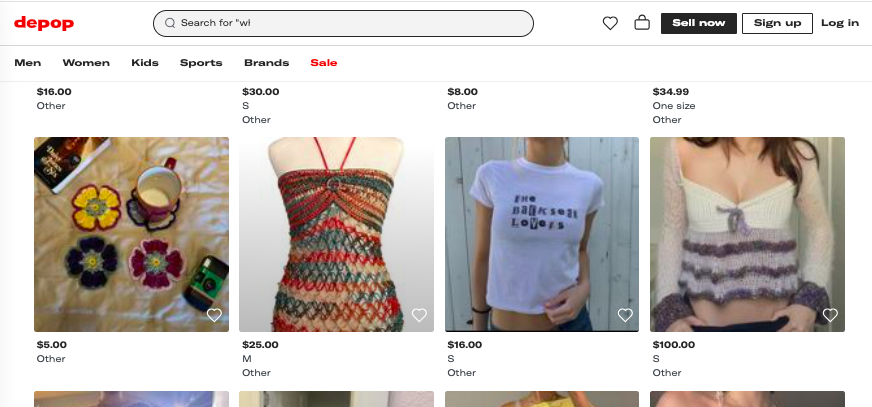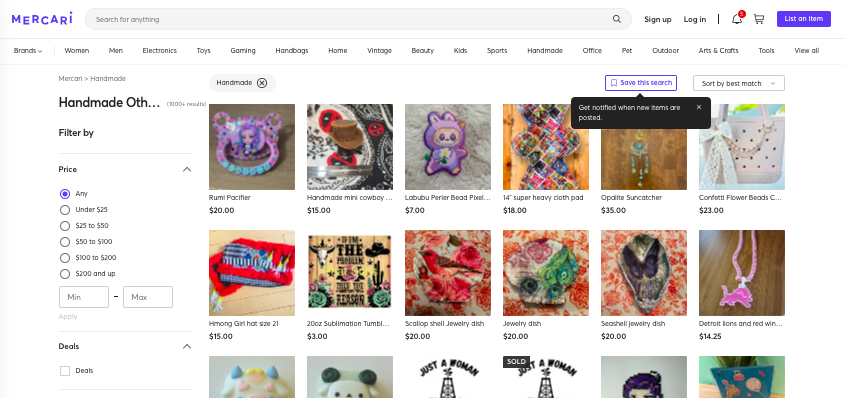Etsy has always been a favorite of artisans and designers selling art and handmade crafts.
However, in the recent years, many sellers have started looking for alternatives.
Why is that? There are a number of reasons Etsy sellers may want to expand beyond the Etsy platform.
For one, the competition has become very fierce. In the past, when there were fewer sellers on Etsy, it was a lot easier for buyers to find you; now, it’s getting harder.
Not only that, but a lot of sellers on Etsy are no longer sellers like you, people creating their own, handcrafted art, clothes, textiles, and other crafts made at home.
Instead, sellers have been importing products and reselling them. Notably, reselling is allowed in the vintage and crafts categories on Etsy.
The problem is that buyers don’t really know the difference between items made personally by the seller and items procured from outside.
Besides, there are sellers who simply want to expand their operations. By selling on more platforms, they can reach more people. Some other platforms offer better marketing tools and opportunities than Etsy.
Irrespective of why you are looking for an Etsy alternative, this article is for you. I will go over some of the top sites like Etsy for selling handcrafted items online.
The list is also helpful for buyers who love buying handcrafted products.
Let’s get into it and explore these sites.
Best Sites Like Etsy
1. Amazon Handmade
Not everyone knows about this, but Amazon has a program called Amazon Handmade. Only artisans are allowed to join this program. You need to get approved to sell here.
If you do get approved to join the artisan program, Amazon will waive the Professional selling fee.
You will then get a custom URL for your shop, so you can promote your shop on your social media profiles, on your website, or in your email newsletters.
It is entirely free to join the program, start an online shop, and sell products. However, you will have to pay 15 percent of each sale to Amazon as a commission.
That’s higher than Etsy’s standard commission (5 percent + transaction fees), so you might have to price your products just a bit higher to make the same margins.
(There is also a minimum commission of $1 — if the product you sell only costs $3, for example, the commission will be $1.)
However, since it’s free to create your store and list items, you won’t really lose.
Also, Etsy charges a small listing fee for each listing you put up, but Amazon Handmade does not. It is entirely free to create a listing.
If you already have a seller account on Amazon, you can’t sell on Handmade automatically. Instead, you need to apply as an artisan for a Handmade account as well.
This ensures the Handmade category is truly open for artisans alone.
Even though Amazon Handmade does not have as many categories as Etsy, it still has a decent selection of product variety.
Do check the official page for updated cost and pricing.
2. Folksy
Folksy is a UK-based site for selling online crafts. Unlike Etsy, it does not allow reselling, so all sellers are artists themselves selling their own crafts. Vintage items though, are prohibited on Folksy.
While Folksy is a British site, it does get visitors from all over the world. Prices are in British Pounds though.
A cool thing about Folksy is that it does not charge any commission on shipping. Etsy, on the other hand, started charging a five percent commission on shipping fees since 2018.
Your first three listings on Folksy are always free. You don’t have to pay anything. After that, you will be charged 15 pence per listing.
You can also sign up for Folksy Plus. Folksy Plus costs £5/month (see here for updated pricing data), but it allows you to create an unlimited number of listings, without any charge.
Another advantage of Folksy Plus Is that you can feature three items (in random order) at the top of your store.
If you already have an Etsy store, it’s even better. Folksy Plus allows you to import products from Etsy to Folksy, saving you a lot of time and effort.
However, you will still have to pay a commission per sale, which is fixed at six percent + VAT.
Also Read: Redbubble Vs Spreadshirt
3. Goimagine
Goimagine is a unique marketplace, as it donates 100 percent of its profits to charity! If you want to sell your handmade products, earn money, and make a difference, sell on Goimagine.
Goimagine is very strict with its handmade selling guidelines. They only allow you to sell something you personally made yourself, or that you worked on with a small group of family members or a small team.
Also, you need to make all your products in the United States. You are not allowed to resell products or sell mass-produced products.
GoImagine offers a free plan which allows 12 listings, but 6.5% transaction fees.
You can sign up for a paid plan too which start from $5/month. See updated prices here.
The good thing is that you will be supporting children in need and helping them live better lives since all the commission fees go to charity.
One thing to know about Goimagine is that you need to apply for a seller’s account.
It will take up to 48 hours for Goimagine to review and approve your account but that also means the platform is for a select group of real artisans, not resellers.
Check Out: Best Ecommerce Website Builders
4. indieCart
indieCart is one of the few Etsy alternatives that does not charge listing fees or commissions per sale.
However, they do charge a $7.50/monthly fee to set up a store and sell on the platform, but there are no fees other than that (except transaction fees that PayPal charges).
IndieCart offers some unique features that make it a worthwhile alternative to Etsy. As a seller, you can:
- Choose the sale type (reserve with deposit, auction, regular sale, etc.)
- Select the currency to sell in (USD, EUR, GBP, etc.)
- Create your own categories and subcategories
- List an unlimited number of products for free
- Blacklist shoppers you don’t want to sell to
- Integrate with Facebook to add your products to your page
- Schedule products to be in stock at a specific date (these are showcased in a calendar for buyers to see)
If you don’t mind the $7.50 monthly fee, I’d say try indieCart for a month and see how it goes.
Check out the latest on pricing here.
5. iCraft Gifts
CraftGifts (also known simply as iCraft) is an online marketplace focused exclusively on handmade art, crafts, fashion and gifts, carefully curated to feature only items made by the creators themselves.
Unlike marketplaces like Etsy, it does not allow vintage products, craft supplies, food or mass‑produced goods. Every item must be brand new and handcrafted by the seller.
iCraftGifts charges a one‑time registration fee of US $25, then a low monthly subscription fee, with $5/month for up to 50 items, $10/month for up to 100 items, or $15/month for unlimited items. Check out the pricing page here for the latest.
There are no listing fees and no commissions on sales beyond the subscription cost, so sellers keep 100 % of their revenue.
The site also maintains strict quality control: all listings and shops are reviewed to ensure high standards, and sellers receive feedback to improve their offerings.
iCraftGifts supports a community of artists with forums, blogs, events, and featured seller spotlights to help with exposure and networking.
6. eBay
eBay is a massive global marketplace that supports the sale of virtually anything, including handmade and artisanal items.
While not exclusively geared toward handicrafts, many sellers have successfully carved out niches for handcrafted jewelry, vintage-inspired home decor, and customized gifts.
It offers flexibility in listing options, including auction-style and fixed-price listings. The built-in audience is a major plus, allowing new sellers to gain exposure quickly.
eBay also offers seller protection and international shipping tools. However, the lack of a dedicated handmade section means your items may compete with mass-produced goods.
Still, with the right branding and SEO practices, sellers can attract loyal customers. Overall, eBay can be a viable Etsy alternative for those willing to work within a broader marketplace.
7. Handmade
Handmade is a platform specifically created to promote and sell authentic handmade goods, making it an ideal alternative to Etsy.
The site emphasizes craftsmanship, original design, and creativity, attracting both makers and buyers who value artisan quality.
Sellers can create personalized storefronts, making it easy to showcase their unique style. It offers tools for managing inventory, setting shipping policies, and marketing products.
Unlike larger marketplaces, Handmade.com maintains a smaller, more focused community, helping handcrafted items stand out more easily.
The approval process helps ensure only genuine handmade products are listed.
While the traffic isn’t as high as Etsy, the targeted audience and niche appeal are strong advantages.
It’s a strong option for artisans who want to avoid mass-market competition.
8. Cratejoy
Cratejoy is a subscription box marketplace that allows creators to build and sell subscription-based offerings, including handmade goods.
It’s a great platform for artisans who can produce recurring items like candles, soaps, stationery, or small-batch crafts.
While not exclusively a handmade marketplace, many of its top sellers offer handcrafted or curated artisanal products.
Cratejoy handles storefront hosting, subscription management, and customer billing, simplifying the logistics of running a subscription service.
The platform attracts a unique audience that values novelty and craftsmanship. For handmade sellers looking to build a loyal customer base with recurring sales, this platform offers a creative alternative to traditional listings.
It also provides marketing tools, SEO support, and analytics. Cratejoy is especially useful for scaling small craft businesses into reliable monthly income streams.
9. CraftIsArt
CraftIsArt is tailored specifically for artisans, crafters, and handmade sellers, offering a focused alternative to Etsy.
It hosts a wide variety of categories such as jewelry, clothing, home decor, and art, all emphasizing handmade and artistic creation.
Sellers get their own storefront and can list items with no listing fees, only paying a small commission on sales. This makes it budget-friendly for small sellers or hobbyists just starting out.
The site also supports blogging, SEO tools, and integration with social media to help sellers market their products. Its user base is smaller than Etsy, which means less competition but also potentially lower traffic.
Nevertheless, for makers looking to join a purely handmade-focused community, it holds appeal. It’s a good pick for artisans who want a platform aligned with their craft-centered values.
10. eCRATER
eCRATER is a free online marketplace and e-commerce store builder that allows users to sell a wide range of products, including handmade items.
Sellers can create their own customizable storefronts without paying listing fees, only incurring fees if using the marketplace.
Though not specifically tailored for crafts, eCRATER supports categories like handmade jewelry, art, and collectibles, giving artisans a place to list unique goods.
The platform also integrates with Google Shopping, increasing item visibility across search engines.
One advantage is the ability to fully control your own shop’s branding and layout. Though you’ll miss the community and resources you get on Etsy.
Still, for cost-conscious sellers and those wanting full store ownership, it’s a practical option. It works well for hobbyists or part-time artisans who don’t want to deal with monthly subscription fees.
11. RubyLane
RubyLane is a niche marketplace known for vintage, antiques, and fine handcrafted items, making it a great fit for artisans who create in a traditional or upscale style.
The platform maintains a curated, high-quality feel, drawing buyers interested in decor, collectibles, fine art, and artisan jewelry.
Handmade items must meet strict quality and presentation standards, which enhances trust among buyers. RubyLane supports seller shops with dedicated sections, clean layouts, and built-in marketing tools.
While the platform charges a setup fee and monthly maintenance fee, many sellers find the higher average selling price worth the cost.
Its buyer base appreciates originality and craftsmanship, offering a more boutique alternative to Etsy.
If your work is artisanal and aligns with vintage or classic aesthetics, this platform is a strong contender. RubyLane is ideal for serious handmade sellers looking to reach a refined, niche audience.
12. Bonanza
Bonanza is an online marketplace that allows sellers to list a wide range of products, including handmade and custom-made crafts.
It’s a good Etsy alternative due to its seller-friendly features, low fees, and customizable storefronts.
Bonanza emphasizes ease of use by allowing bulk imports from Etsy, eBay, and Amazon, making transitions smoother.
Handmade sellers benefit from the platform’s flexibility to brand their own shop while still being part of a larger marketplace. Although not exclusively handmade-focused, Bonanza supports one-of-a-kind and artisan listings.
It also provides tools for advertising across Google Shopping and other ad channels. The community is smaller but often more engaged than on larger platforms.
Overall, it’s a solid choice for handmade sellers who want autonomy and lower fees.
13. Depop
Depop is a social shopping app popular among younger buyers, often used for selling vintage, handmade, and custom fashion or accessories.
While it originally catered to resale items, many artisans now use the platform to offer handmade jewelry, upcycled fashion, and personalized pieces.
Its Instagram-like interface allows sellers to build a following and interact directly with customers, which is a unique advantage over Etsy.
Depop is particularly effective for creative sellers who can market themselves visually and appeal to Gen Z and millennial buyers.
Listings are easy to create, and the mobile-first approach makes it convenient for side hustlers and full-time crafters alike.
While not a traditional crafts marketplace, its focus on unique, creative items aligns well with handmade goods.
For visually-driven sellers, Depop can be a powerful channel to grow organically. It works best for trendy, wearable, or lifestyle-oriented handmade products.
14. Mercari
Mercari is a peer-to-peer marketplace that allows users to sell a wide variety of items, including handmade goods.
Though not exclusive to crafts, it welcomes sellers offering handmade candles, decor, accessories, and more.
Its user-friendly mobile app makes listing fast and easy, appealing to casual and new sellers.
Mercari handles shipping logistics, provides prepaid labels, and includes some seller protection features.
While it lacks dedicated tools for artisan branding, many makers successfully use it for additional exposure.
The platform charges a flat 10% selling fee, which is competitive and transparent.
Mercari is more general than Etsy, but still offers potential for crafters seeking a broader, often budget-conscious audience. It’s a suitable secondary platform for handmade sellers looking to diversify their reach.
Final Thoughts
Amazon Handmade is the best Etsy alternative, without a doubt.
Sure, it charges a bit more per sale than other Etsy alternatives, but there really isn’t another handcraft marketplace that gets nearly as much traffic.
That said, you should be prepared to compete with thousands of other sellers on Amazon in your niche.
I’d also suggest setting up stores on marketplaces that do not charge monthly or listing fees.
While it may take a little longer to settle down and make sales on these platforms, consistency and patience is the key that often pays off.
If you’re a shopper though, feel free to visit any site. You’re sure to get some unique art pieces that are totally handmade.






